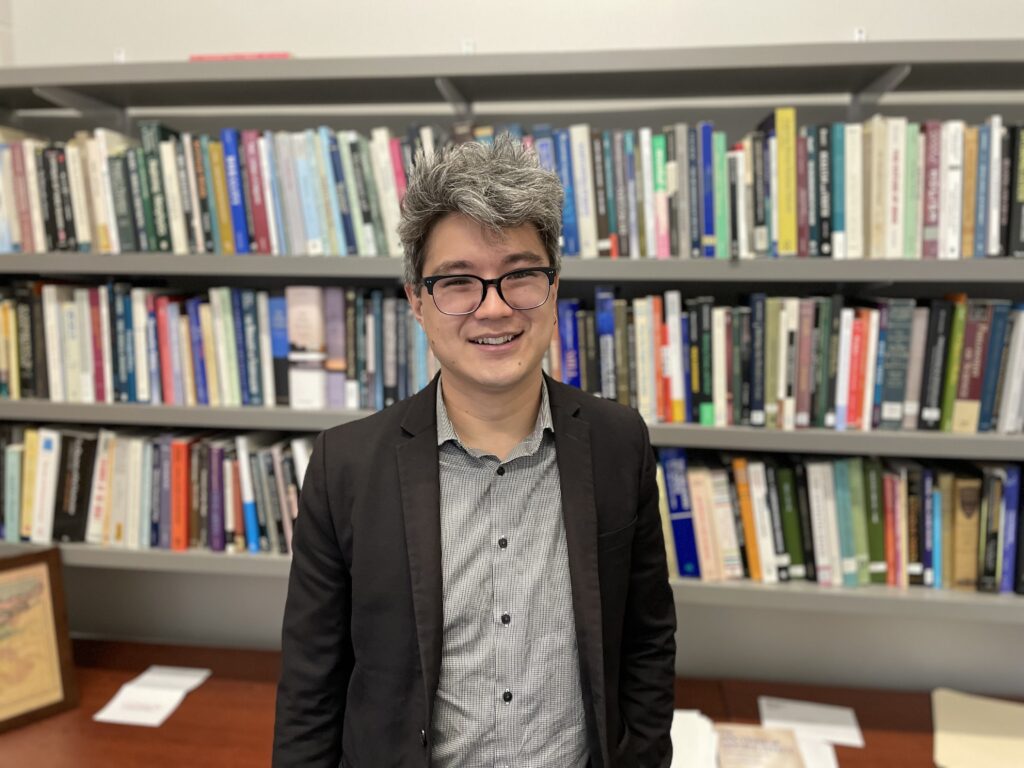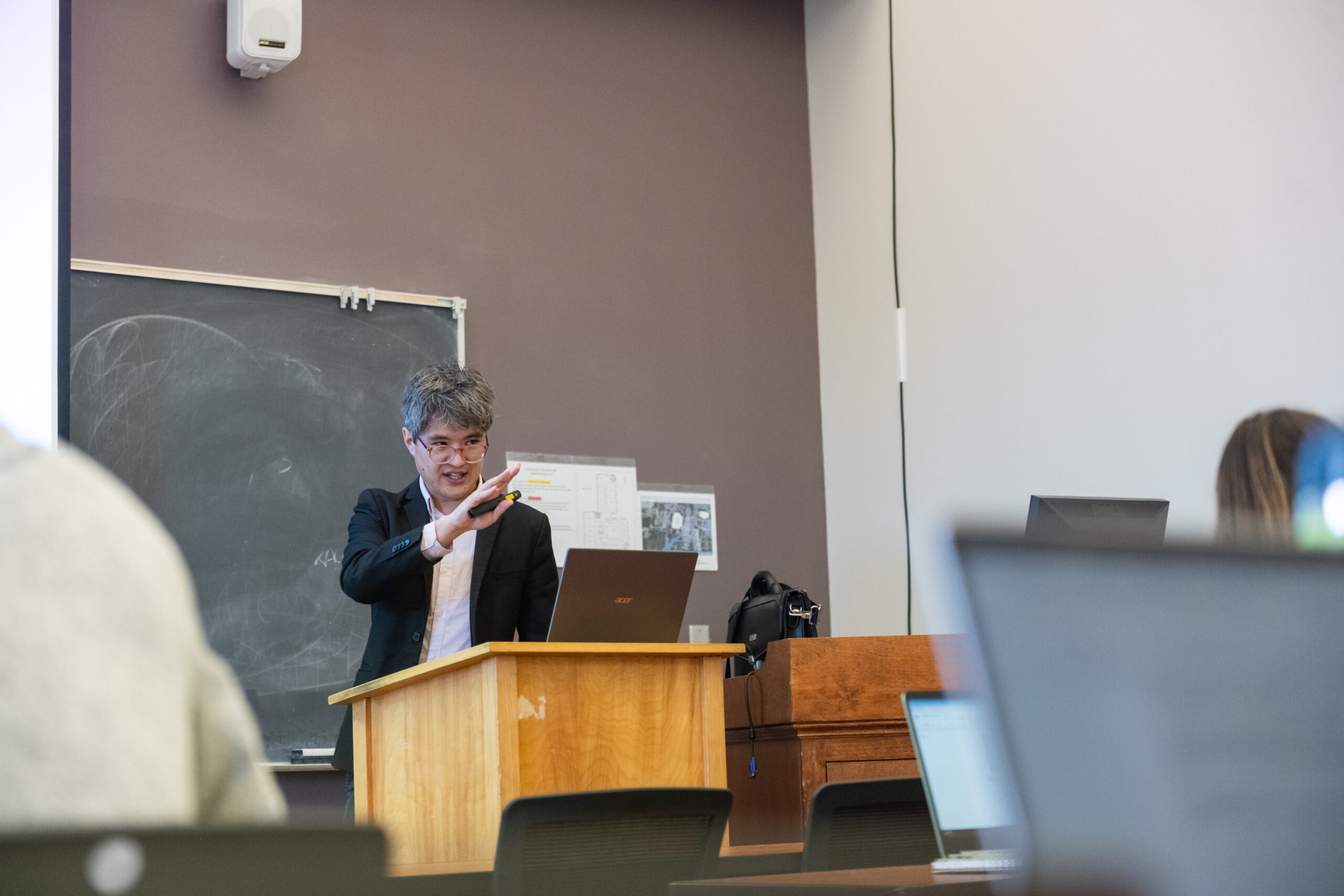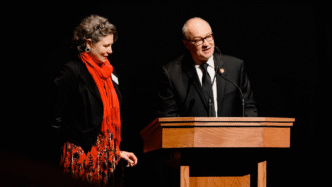The academic odyssey for Quinn Hiroshi Gibson spans continents, but he’s settling into Upstate South Carolina in his third semester teaching in Clemson University’s Department of Philosophy and Religion.
Born in Calgary, Canada, Gibson’s prior stop before serving as an assistant professor of philosophy happened to be the same role at the American University of Beirut. He volunteered to teach an introduction to philosophy course with Mt. Tamalpais College, which sent Gibson to teach San Quentin State Prison inmates in Marin County, California.
“Many of them hadn’t been in a classroom of any kind since grade school, which meant decades for some,” he said. “Seats in the prison’s college program are highly coveted. They all felt very privileged to be there and were highly motivated to get as much out of it as they could. You could just see how much being exposed to the wider intellectual world was making a difference for them.”
Gibson teaches courses at Clemson on ancient philosophy, the philosophy of medicine and biomedical ethics, among other offerings. He is the son of airline workers who met working for the same company – Wardair Canada – and supported his philosophically curious tendencies that began in college.

“They were very supportive parents and trusted me. There are a lot of lawyers on my mom’s side of the family who wanted me to go to law school,” Gibson said. “I thought about it because a lot of philosophy students go to law school, but I don’t want to be measured by my billable hours.”
The intersection of philosophy of mind, philosophy of science and ethics are all of research interest to Gibson.
His work aims, in part, to understand how addiction affects ordinary life in a state seeing an alarming increase in the number of drug overdose deaths.
“Addiction is an immense health and social burden. But we don’t really understand it,” he said. “We have some really smart people working on it, but there is a lot of confusion floating around and we don’t have a general understanding of it in terms that matter in ordinary life. Only once we have that will we have the slightest clue how we should think and feel about it, how we can ameliorate it, where we can, and how we can live with it, when we must.”
Dr. Gibson is an excellent example of what our department seeks: a world-class scholar who is also an excellent teacher. We look forward to having him help enrich our major for many years to come.
KELLY SMITH, DEPARTMENT OF PHILOSOPHY AND RELIGION CHAIR
Gibson’s interview with Clemson News has been edited for length and clarity.
Clemson News: What are you working on right now?
Quinn Gibson: “I just published a paper on addiction and responsibility. The idea there is that addiction is a pretty complicated empirical phenomenon. There are tens of thousands of scientists looking into it on all different levels – neuroscientists, epidemiologists and social scientists. There’s this very complex picture that emerges of all the different mechanisms that operate to produce and sustain this pattern of behavior and motivation that you find in addiction. As a philosopher, I feel like the thing we want is a way of understanding the significance of all of that science at the level of ordinary personal and interpersonal concern.
“One of the things we want to know is, what does all this mean for how we should think about and feel towards people who live with addiction? What’s the bottom line? “I think what the neuroscience of addiction ultimately tells us about how the ordinary economy of choice, judgment and action is affected by brain changes that are caused by long-term exposure to addictive drugs – that’s a philosophical matter rather than a purely scientific one because the way we think about choice, judgment, and action invokes all of these evaluative notions like blame, anger, forgiveness and moral or even legal responsibility.”
CN: You spent three years living in Lebanon. What was that experience like?
QG: “It was wild. I was at the American University of Beirut. It’s this lovely, old and prestigious university that’s the best in its region, by far. It’s been around for 150 years or so. Right after I arrived, the whole country faced this gigantic crisis caused by corruption and financial mismanagement. The banking sector became insolvent overnight; ordinary people couldn’t access their money. They import everything, so the price of everything went through the roof and the middle class disappeared.
“Our salaries lost all their value, more or less. We were down to 5 percent of our former value. I happened to be in New York during the 2020 explosion. My apartment was damaged. Every window in the city of a three or four-mile radius was destroyed. My refrigerator was knocked over, and things were damaged.”
CN: How did you end up at Clemson?
QG: “I can’t say I would have ever anticipated ending up in Upstate South Carolina, but in academic life we don’t always get to choose where we go. I was living in Beirut, the situation was becoming more difficult and the Department of Philosophy and Religion was doing some really good hiring before I got here. Lots of exciting folks were coming through, and obviously, I was highly motivated to find another job. I’m excited to be here.”
CN: What have you enjoyed about your interactions with Clemson students?
QG: “The mannerisms are charming. They’re very open-minded, I find. They come from this cultural milieu that I took a little while to recognize. Most of them come from some kind of Protestant background, more religious than I’m used to. They’re very willing to hear challenging ideas, I think. The best students here are as good as the best students anywhere.”
CN: What can we learn from studying self-deception?
QG: “Intuitively, self-deception is what we do when we trick ourselves into believing something we also think isn’t true. But if you think about it, that’s pretty hard to do. For one thing, if you already think the thing is true, the question is no longer open for you. For another, you can’t just believe at will. So, how do we do it? Human beings are probably the only creatures capable of this. It’s an artifact of our own cognitive and evolutionary uniqueness that we’re vulnerable to this structural problem where we can deceive ourselves. It seems important to be able to describe the features of our minds in virtue of which we can pull this off. Self-deception involves a kind of thought that only minds with a certain degree of complexity and a certain kind of organization can engage in, and since we seem to have minds of that type, it contributes to our self-understanding to say how we can do it.”







